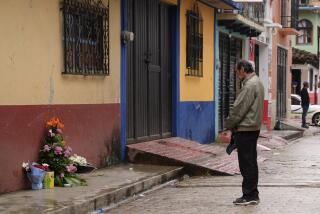Reportedly Slain Priest’s Family Sues U.S. for Papers
The family of an American priest, who reportedly was executed by military authorities in Honduras five years ago, filed suit in Los Angeles on Thursday seeking disclosure of classified documents they believe may prove that the U.S. government had knowledge of his death, or even was involved in it.
The federal court suit culminated a four-year effort by the family to unravel the circumstances of Father James Francis Carney’s disappearance in the jungles of the Central American nation in 1983.
Mounting evidence, including the corroboration of a Honduran military intelligence deserter, have led the family to believe that the Roman Catholic priest from St. Louis was captured by the Honduran military, interrogated and then hurled to his death from a military helicopter over the jungle, said Peter Schey, the attorney representing the family.
Information Received
The lawyer added that the family has received information that U.S. government personnel may have interrogated Carney after his capture and were aware of his death order.
“The lawsuit seeks . . . to require government agencies to disclose to the family precisely what the U.S. government knows or doesn’t know regarding the capture, torture and assassination of Father Carney,” Schey told a press conference, where he was joined by two sisters and a brother-in-law of the slain priest.
Carney--labeled a “radical” by both Honduran and U.S. government officials, but known as “Padre Guadalupe” to the peasants he ministered to for 20 years--was expelled from the tiny country in 1979, Schey said.
“He was an organizer and he was fearless,” said Maureen Carney, a Los Angeles psychologist, explaining why Honduras authorities regarded her brother as a threat. “His life was threatened, he was imprisoned several times, his small shack was riddled with bullets. But he would not be intimidated.”
‘Strong Feelings’
The Honduran government considered him “controversial” because of his “strong feelings about social justice,” according to a State Department memorandum, one of the 200 documents obtained by the priest’s relatives through the Freedom of Information Act.
About 300 additional documents have been denied the family by federal agencies, claiming national security and foreign policy reasons, Schey said. Those documents and denials are the focus of the family’s lawsuit, the lawyer said.
The documents, from various U.S. government agencies, indicate that the 58-year-old priest re-entered Honduras in 1983 with a small band of revolutionaries, Schey said. Government documents indicate that the priest’s aim was to minister to the group’s spiritual needs. And, once the group was detected by Honduran military authorities, government documents indicate that U.S. intelligence agencies closely monitored and received detailed information of the military operation against the band of about 100 men, the attorney added.
‘Wipe Out the Group’
“We believe that the Honduran military, with the knowledge of the U.S. government and assistance of U.S. military advisers, made the decision to essentially wipe out the group,” Schey said.
While the Honduran military reported that Carney had died of starvation in the jungle, his family says the evidence is overwhelming that he was captured, tortured and executed by the military.
Schey said that government documents indicate that captives of the small guerrilla band were taken to a Honduran military camp operated by the CIA and that U.S. government personnel took part in interrogations of the captives.
The former Honduran military intelligence deserter, who was at the camp at the time, told the family that orders to kill the captives were given in the presence of U.S. government personnel.
The CIA would neither confirm nor deny the existence of the documents sought in the suit and told the family that such documents would, in any case, be classified, Schey said.
Calling the CIA response “profoundly disturbing,” the lawyer asked, “If the CIA was not present, why not disclose the fact?”
More to Read
Sign up for Essential California
The most important California stories and recommendations in your inbox every morning.
You may occasionally receive promotional content from the Los Angeles Times.










